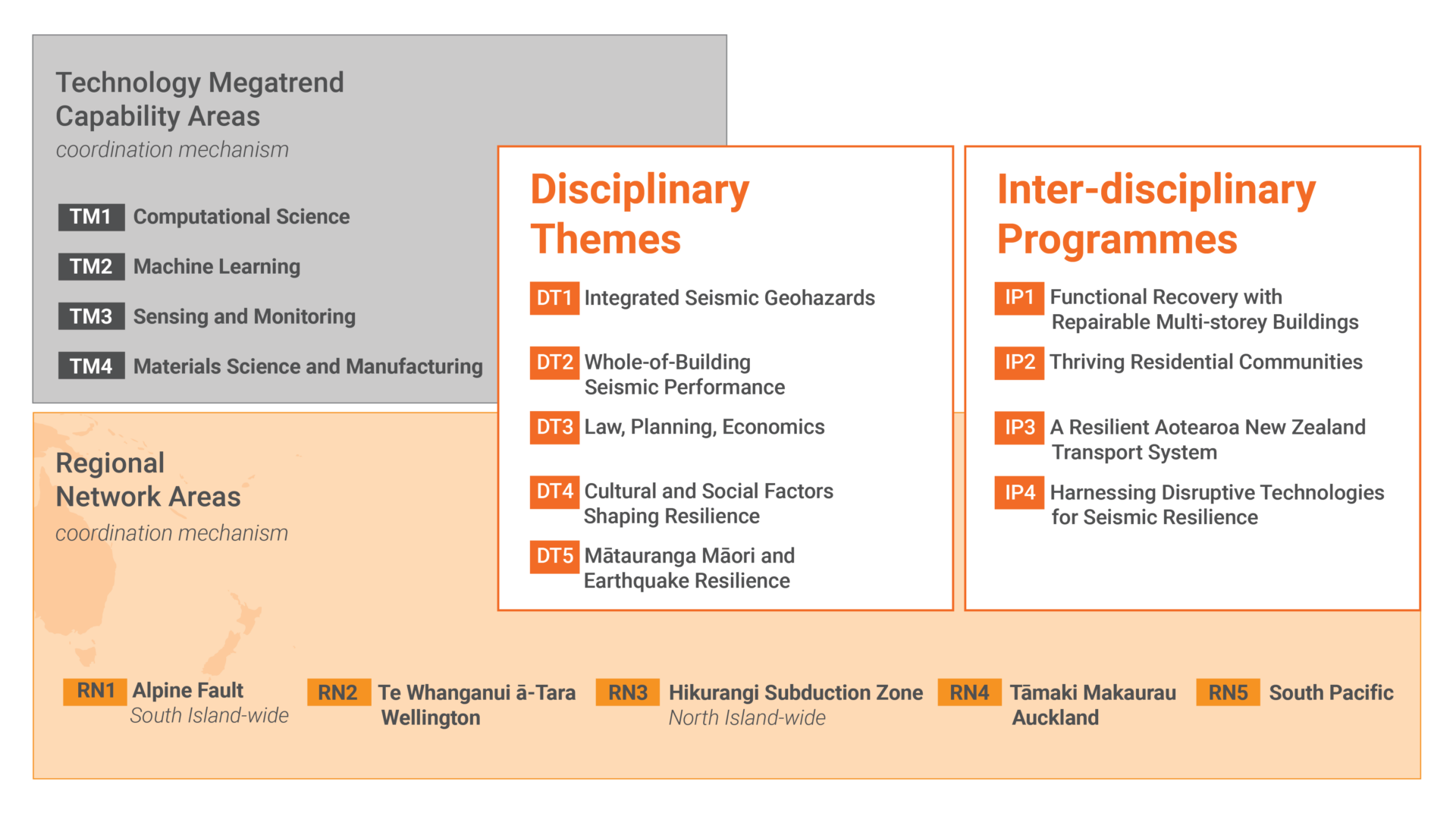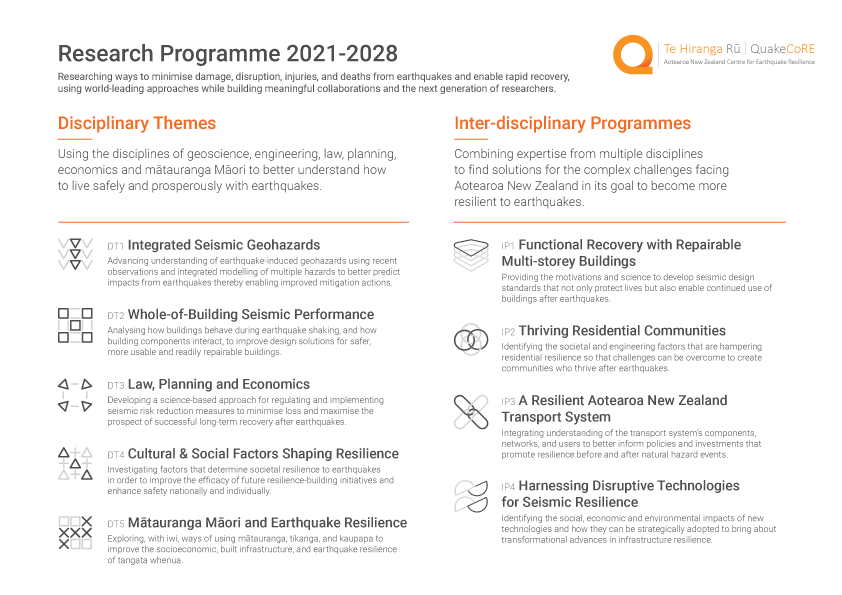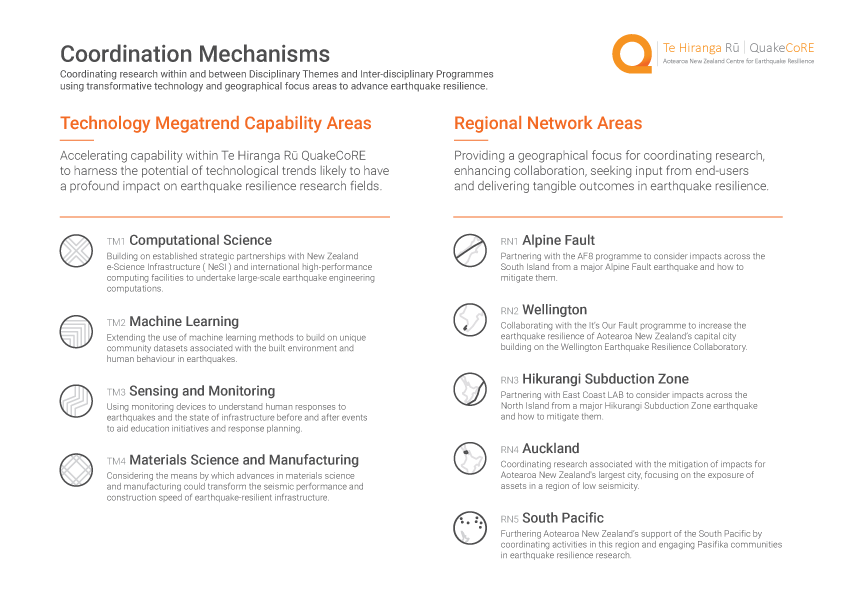Research
‾‾‾‾‾‾‾‾
QuakeCoRE aims to establish and link multi-institutional national research programmes that are internationally networked. The research programmes will advance the science and implementation pathways of earthquake resilience through system-level science with highly integrated collaborations coordinated across the physical, engineering and social sciences and relevant research institutions. Our research is organised into Disciplinary Themes, Inter-disciplinary Programmes and the Coordination Mechanisms of Technology Megatrend Capability Areas and Regional Network Areas.

Figure 1: Te Hiranga Rū QuakeCoRE (Phase 2) Research Structure. Disciplinary Themes collectively span the disciplinary pipeline of earthquake resilience research and focus on transformative research questions; Inter-disciplinary Programmes leverage Aotearoa New Zealand’s unique challenges and opportunities toward the global vision of earthquake resilience using Aotearoa New Zealand as a natural earthquake laboratory; Coordination Mechanisms enhance the Disciplinary Themes and Inter-disciplinary Programmes through accelerating capability development and utilization of research technologies, and regional networks that provide connectivity and a pathway to impact.
Disciplinary Themes
Research areas that collectively span the disciplinary pipeline of earthquake resilience and focus on transformative research questions in which Aotearoa New Zealand researchers have shown global leadership.
DT1 Integrated Seismic Geohazards
Advance understanding and modelling of individual earthquake-induced geohazards (ground motions, liquefaction, and slope instability), as well as unified data collection and modelling approaches to enable an integrated prediction in order to more efficiently mitigate future impacts and stimulate rapid advances in the profession.
Leaders: Brendon Bradley, Rolando Orense, Tim Stahl
DT2 Whole-of-Building Seismic Performance
Develop fundamental understanding, and methods and models for the quantification of, whole-of-building seismic performance through direct consideration of structural and non-structural component interactions, as well as advances in seismic design and assessment considering life-cycle analysis.
Leaders: Rick Henry, Santiago Pujol
DT3 Law, Planning, Economics
Investigate economic impacts of earthquakes, and create the evidence base to inform regulation for effective planning, policy and mitigation to build resilience – including whole-of-economy earthquake impact modelling, assessment of specific resilience-building legal and planning tools and processes, and behavioural ‘nudges’ to incentivize resilience.
Leaders: Ilan Noy, John Hopkins, Olga Filippova
DT4 Cultural and Social Factors Shaping Resilience
Collaboratively understand, model and improve the critical cultural and social factors determining societal resilience to earthquakes in Aotearoa New Zealand, including human responses to earthquakes, temporal and spatial variation of risk, and building an earthquake-resilient society.
Leaders: David Johnston, Caroline Orchiston
DT5 Mātauranga Māori and Earthquake Resilience
Community-led and co-designed participatory research to create and innovate mātauranga Māori (Māori knowledge) that will facilitate achievement of the earthquake resilience aspirations of tangata whenua. Knowledge translation of research findings will encourage increased understanding within Te Hiranga Rū QuakeCoRE, of iwi, hapū and whānau perspectives on earthquakes and disaster risk reduction.
Leaders: Anthony Hoete, Christine Kenney, Tūmanako Fa'aui
Inter-disciplinary Programmes
Inter-disciplinary research that leverages Aotearoa New Zealand’s unique situation and challenges to advance the vision of earthquake resilience. These programmes draw on expertise in multiple disciplinary themes.
IP1 Functional Recovery with Repairable Multi-storey Buildings
Repair of earthquake damage is a critical component to the recovery after an earthquake disaster. After recent events, the time to return the commercial and industrial building stock to functionality has been hindered by the lack of understanding of residual capacity and repair. This programme will identify time-to-functionality targets and repairable building solutions, thus providing the underlying science to support the development of the world’s first functional recovery-based seismic design standard.
Leaders: Geoff Rodgers, Alice Chang-Richards
IP2 Thriving Residential Communities
The Canterbury earthquakes illustrated the potential for large financial losses ($16B of $40B total) and multi-year disruption to Aotearoa New Zealand’s residential sector, with significant implications on mental health and the disaster insurance market. This programme will tackle the problem of resilient housing – including effective engineering and technological solutions, land-use planning, improved insurance processes and frameworks, effective legislation, and communication and engagement strategies.
Leaders: Tim Sullivan, Julia Becker
IP3 A Resilient Aotearoa New Zealand Transport System
A resilient transport and logistics system is critical to the ongoing and future viability of businesses and communities across the country, supporting the efficient movement of goods and people. This programme will integrate component- and system-level modelling of networks and their users, consider interaction between different transport and logistics modes, and the social and economic impacts of disruption, to inform policy and investment decisions on the transport and logistics systems of the future.
Leaders: Liam Wotherspoon, Charlotte Brown
IP4 Harnessing Disruptive Technologies for Seismic Resilience
This programme will identify how transformational (i.e. order of magnitude) advancements in Aotearoa New Zealand’s infrastructure resilience can be achieved through strategic adoption of disruptive technologies, via government and market-led initiatives. A central hypothesis is that rapid adoption of several disruptive technologies (e.g. distributed solar power) will result in a significantly greater resilience gain than the conventional wisdom of incremental investment to improve existing asset classes (e.g. centralized transmission networks).
Leaders: Nirmal Nair, Garry McDonald
Coordination Mechanisms
Coordination Mechanisms enhance the Disciplinary Themes and Inter-disciplinary Programmes through accelerating capability development and utilization of research technologies, and regional networks that provide connectivity and a pathway to impact.
Technology Megatrend Capabililty Areas
Research technologies provide a platform upon which leading-edge research can be undertaken. QuakeCoRE will pursue strategic capability development in the areas of technology megatrends that will have an outsized impact in earthquake resilience research fields. The intent of these capability areas is to accelerate the depth and extent of adoption by QuakeCoRE researchers in the Disciplinary Themes and Inter-disciplinary Programmes, as compared to that which would occur passively, and thus harness their transformative potential toward the earthquake resilience mission.
Regional Network Areas
The Regional Network Areas act as a co-ordination mechanism provide contextual relevance and rapid embedding of research solutions into tangible advances in earthquake resilience. Notably, the research connected to the Regional Network Areas will see rapid public exposure through the newly developed ‘Natural Hazard Education Alliance’



